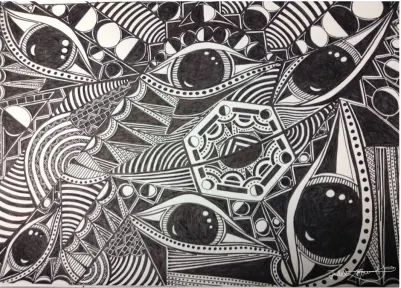Did you know that over a third of graduate students experience mental health concerns?1 Graduate school and Master’s or PhD level careers in any field may naturally attract perfectionists; specifically, the strenuous and demanding nature of many STEM fields draws a crowd of highly intelligent and creative minds, but that often comes with being very self-critical. Although this self-criticism and perfectionism in moderation can drive people to work hard and keep striving for improvement, too much can create the perfect storm for many academically-driven anxieties and other mental health issues, whether transitory or long-lasting. Speaking from personal experience, I think these issues, although challenging, can come with a silver lining: cognitive diversity that benefits us as individuals and as a scientific community.

While in graduate school, many students report pervasive feelings of inadequacy and the inability to live up to the expectations they believe were set for them when they were admitted. One version of this false sense of inadequacy is called “impostor syndrome” – the feeling that you aren’t really as qualified or accomplished as other people think (despite all evidence to the contrary), and the fear that people will discover your “deception”.2,3 It’s very common for high achieving people (such as graduate students) to experience imposter syndrome at least sometimes4; however, many graduate students also suffer from more serious conditions and lasting mental health issues, including anxiety disorders and depression.1,5 In fact, a study of UC Berkeley graduate students found that 35% of those polled reported seeking treatment for mental health related issues during their time in a graduate program.1
The taboo against and lack of understanding relating to mental health conditions has affected me personally, as I suffer from Obsessive Compulsive Disorder (OCD). For me this primarily manifests as “just right” OCD and measuring. “Just right” feelings have been a part of my life for as long as I can remember. These feelings entail a constant sense of an internal balance being off, a mental itch that can’t be scratched. It can feel juvenile at times – like feeling sick but lacking the language or understanding to describe it to others, which only multiplies the frustration. The desire to make things feel “just right” drives various compulsions, all of which transiently quiet the “just right” beast yet ultimately just exacerbate and anger it. These feelings plague me frequently and causelessly, and often make it difficult to navigate my daily life. A moment that is normally thoughtless or mentally spacious for the average person, is for me occupied by a feeling of imbalance and frustration, followed quickly by secondary OCD compulsions and constant measurement of my intellect, appearance, personality traits, and daily interactions with others.

Until now, I decided not to speak about my experience with OCD, out of fear of judgment, stigma, and a potential cost to my future employment. However, I want to stand publicly as an OCD sufferer to confront misconceptions both about what constitutes OCD and what people with OCD can achieve.
Despite the constant frustration associated with my OCD, I find that it drives me to be both artistically and scientifically creative and driven. For example, throughout this post I am sharing some of my artwork, a creative process that I find temporarily tames my “just right” beast. The process of drawing allows me to think more clearly about my science and logically tackle experimental issues and concerns. Finally, I would argue that because of (rather than in spite of) my OCD, I contribute positively to the cognitive diversity within the scientific community. In fact, I often find that my unique mental space improves my willingness to explore unusual pathways in research and increases my patience when learning and establishing new methods.
At times, it can feel like a daily battle. However, this battle makes me thankful for the privilege to attend graduate school, and gives me a realistic frame of reference for human struggles, with stark contrast between my constant struggle with OCD and the difficult (yet transient) and ultimately rewarding experience of graduate school.
Diversity is, at its core, a function of the cognitive and stylistic variation within a population. Thus, diversity not only arises from differences in life experiences derived from a person’s racial, ethnic, and socioeconomic background, but also relates to the natural mental and emotional variety within a population that can result from one’s experiences or from baseline differences in cognitive function. I strongly believe that having a diverse population of different types of minds can increase creativity as a whole. Creativity is what drives scientific curiosity and exploration, and I believe the scientific space as a whole would be improved if cognitive diversity were discussed both openly and positively. I would encourage the scientific community to start more openly discussing the relationship between mental health and diversity, and I hope to inspire others to openly discuss mental health in graduate school and beyond, with a focus on empowering and appreciating cognitive diversity.

REFERENCES
- Djokić, D. & Lounis, S. This is Your Mind on Grad School. Berkeley Science Review, April 27, 2014.
- Weir, A. Feel Like a Fraud? gradPsych Magazine, Nov, 2013.
- Warrell, M. Afraid Of Being ‘Found Out?’ How To Overcome Impostor Syndrome. Forbes, April 3, 2014.
- Harkness, J. I Don’t Deserve to Be Here: the prevalence of impostor syndrome among successful leaders. Dynamic Business, Sept 5, 2016.
- Breines, J. Graduate School and Mental Illness: Is There a Link? Psychology Today, Nov 26, 2015.
MORE RESOURCES ABOUT MENTAL ILLNESS
- International Obsessive Compulsive Disorder (OCD) Foundation
- Anxiety and Depression Association of America (ADAA)
- Understanding Anxiety
- American Psychological Association (APA)
- National Alliance on Mental Illness (NAMI)
- Mental Health.gov
- National Institutes of Health (NIH): Mental Health Information
- Video: Depression in Graduate School – How Common Is It?





Great post and art – Izzy!
Thanks QC!
Hi Izzy, thank you so much for writing this article. You hit the nail on the head. I suffer from depression and am a graduate student at UC-Berkeley, and I also create artwork as a means to process my thoughts and emotions, as well as to help others understand their own feelings and foster discussion among us. I do find that my mental illness does offer me perspectives others may lack, and like you the creativity it gives me is a double-edged sword.
I would like to say that in small settings, like within lab groups among the graduate students and postdocs, to some extent structures for discussing cognitive diversity are developing. Here at UC-Berkeley there are various organizations to support the mental health of graduate students. Science communicators like yourself are addressing these topics more and more. I would hope that figures with more authority will begin to recognize these issues directly, but I think that will come with time and a perceived “direct need” for doing so. So, if we could somehow measure or predict drops in productivity due to mental illness or even prolonged stress, that may be some of the data we need.
Thank you for commenting and sharing, I’m really glad to hear that these discussions are becoming more prevalent and hopefully less taboo. We will both become authority figures relatively soon, so I think it’s especially important for us to make a promise to ourselves to be understanding, compassionate, and open about mental health when we enter positions of authority. That’s so awesome about your artwork, and yes I find that it really helps me as well.
One thing that I think is really interesting is the cause/effect of mental health in graduate school. A lot of mental health conditions are induced by the stresses of graduate study, and I feel that these are the conditions/situations that are being discussed more openly. However, the reverse relationship is not as openly discussed – the fact that mental health and cognitive function may be what attracts certain people to certain fields. It’s extremely difficult to specifically discuss OCD with people because portions of it are so taboo and there is such a huge misunderstanding about what it is (NOT just cleaning, because I’m sort of a slob!) and what causes it (much more genetically that situationally driven).
For me, OCD is a “pre-existing condition”, i.e. I’ve battled it my whole life versus it being induced by stresses of graduate study. In a way, I think it’s driven me towards both science and art, because these are things I can do until they ‘feel right’.
Anyways, I look forward to us becoming the next generation of authority figures. Let us be thoughtful and compassionate! Best of luck with your graduate studies 🙂
Oh yeah, there’s lots of cause and effect with mental health in graduate school. I have found that my mental health has worsened in unexpected ways in graduate school, and I imagine this is true for many of us. And with OCD, I’m sure there is some sort of correlation…that would, of course, be interesting to investigate, and that also makes it difficult to quantify. I can see how it propels you to search for the “right” feeling with science, art, and other aspects of your life. I hope that you continue to strive for the “right” and the excellent in all that you do, in a way that allows you to respect yourself.
Thanks! Here’s to a future of leaders who are more caring and conscientious.
Thank you for sharing. I learned from this. While I was working to my MA and my MFA, a terminal degreee, I often felt like I just couldn’t get it right, translated perfect. From personal experience, I believe it is essential to tap from both sides of the brain. Everything is more enriched. The perspective is so much more complete.
I’m really glad to be a part of your learning experience. Yes, science and art (often viewed as two polar opposites) tap from both sides of the brain and I do also think it makes my life more complete to pursue both to some degree. Thank you for commenting and sharing!